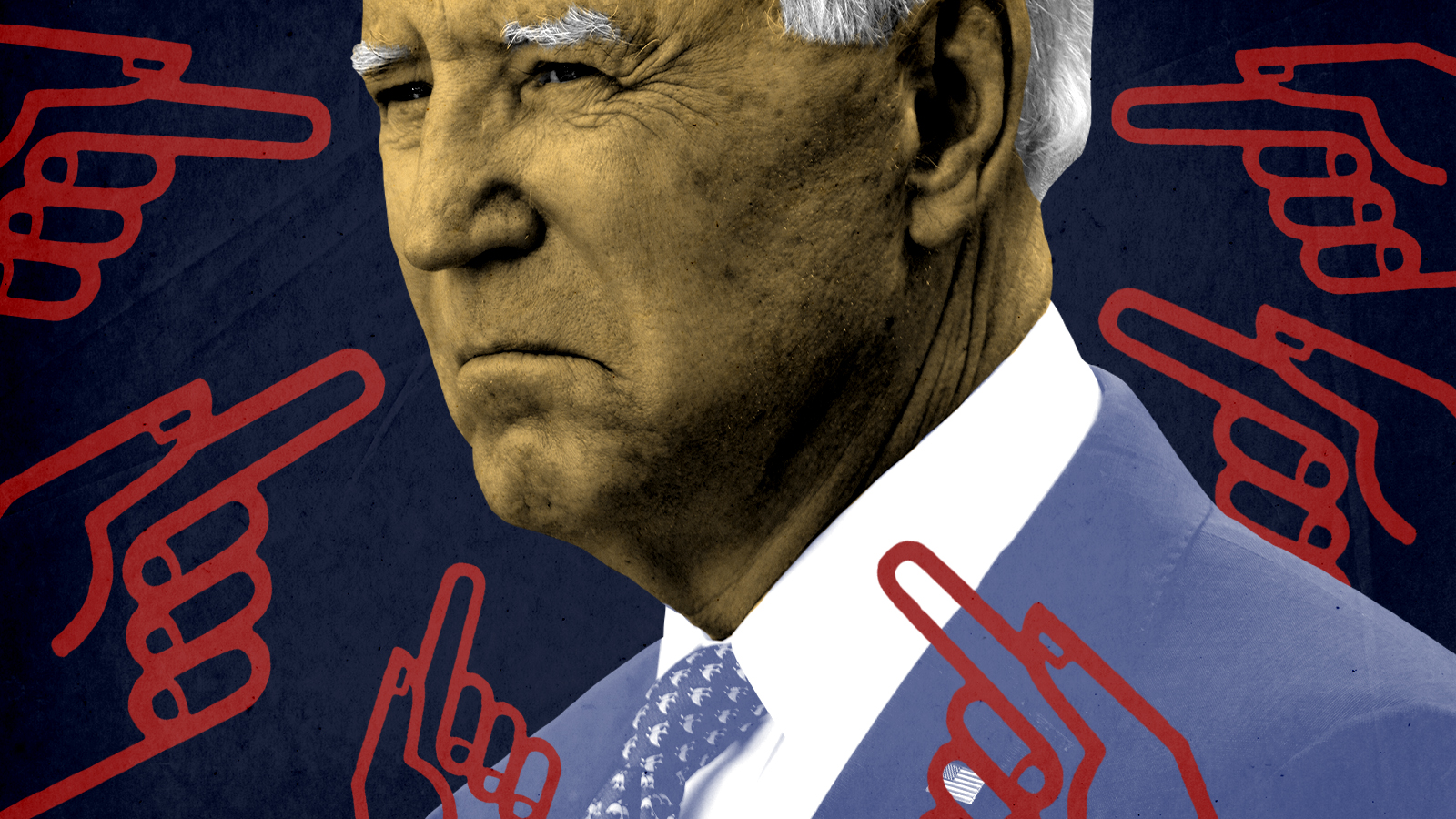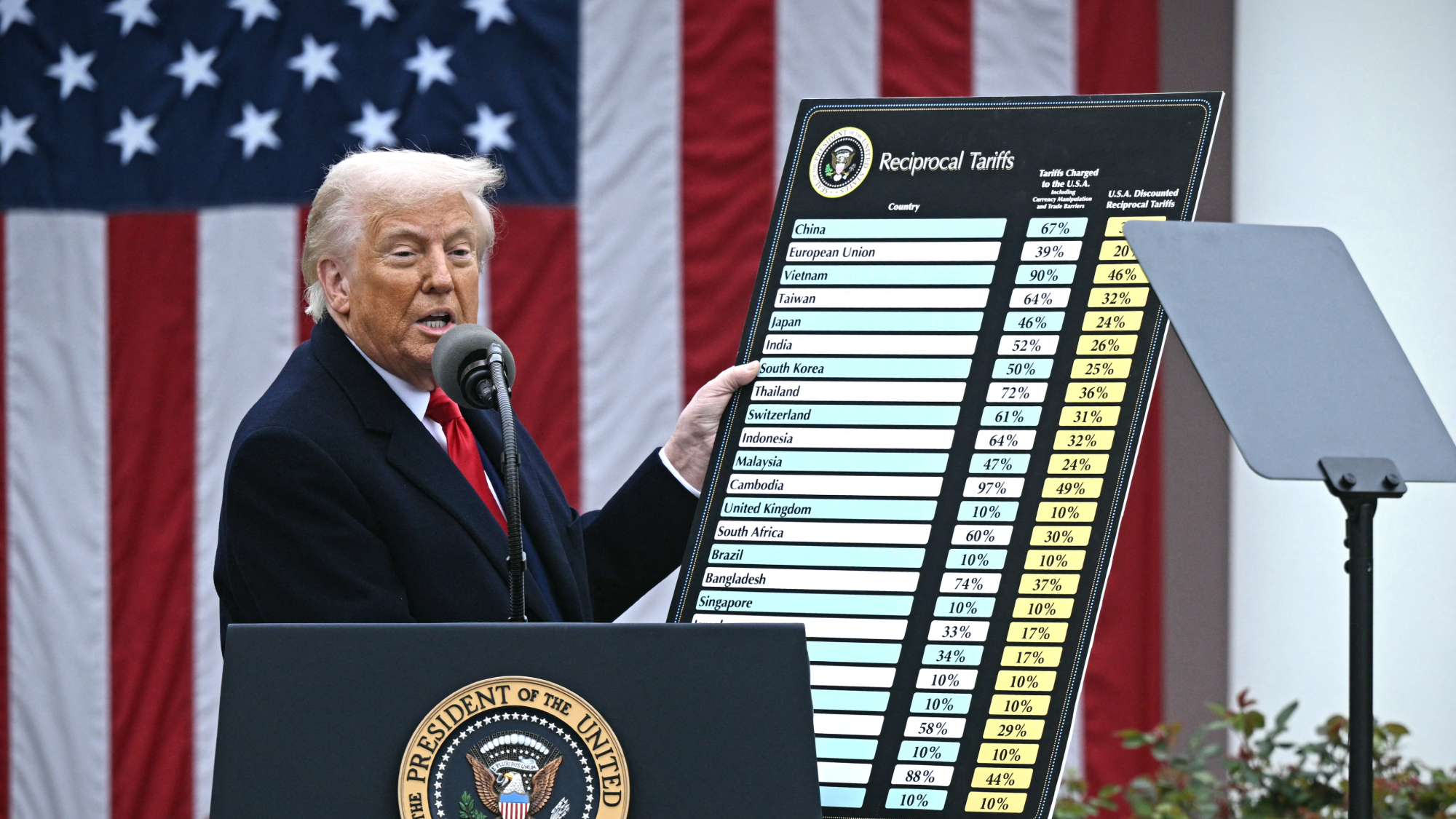The toxic politics of bad economic news
Why Republicans rejoiced over a GDP drop — and how it could backfire


A free daily email with the biggest news stories of the day – and the best features from TheWeek.com
You are now subscribed
Your newsletter sign-up was successful
Conservatives could barely contain their glee Thursday morning when news broke that the U.S. economy contracted by 1.4 percent on an annualized basis during the first quarter of 2022.
A declining gross domestic product can be a sign of a looming recession. But when it's combined with already high inflation, something worse becomes possible: stagflation. This combination of economic contraction with inflation walloped the Americans economy through the 1970s and early 1980s and played a significant role in helping Ronald Reagan make Jimmy Carter a one-term president. It's most likely happy memories of that seminal moment in the history of the Republican Party that made so many conservatives giddy.
They should be careful. For one thing, there are three components to stagflation: inflation, declining GDP, and high unemployment. The first is firmly in place, the second is now rearing its head, but the third is, so far at least, nowhere in sight. Unemployment at the moment is sitting at 3.6 percent, which is extraordinarily low by historic standards. It's certainly possible that the number will rise — indeed, it almost certainly will if GDP continues to contract into the second quarter, let alone beyond that. But for now, the job market remains hot, which means that so far 2022 feels nothing like 1979.
The Week
Escape your echo chamber. Get the facts behind the news, plus analysis from multiple perspectives.

Sign up for The Week's Free Newsletters
From our morning news briefing to a weekly Good News Newsletter, get the best of The Week delivered directly to your inbox.
From our morning news briefing to a weekly Good News Newsletter, get the best of The Week delivered directly to your inbox.
But beyond the technical definition of stagflation, there's the complicated way economic data interact with perceptions of reality on the part of ordinary Americans. In dancing a jig about President Biden's misfortune, Republicans run the risk of misreading that interaction and looking like they're actively cheering on further bad news.
Consider inflation. When new data about rising prices is released every month, it describes a reality every American perceives. How much that reality hurts will be a function of each person's income, savings, and wealth. A rich person might notice that gas, food, and other consumer products and services are becoming more expensive, but it won't create a serious problem for personal budgeting. Those who are middle class, by contrast, will struggle, and the poor might be hurt quite badly. But the perception of rising prices is nearly universal. It's what's happening. The official number released by the government merely puts a figure on the lived experience, giving people something to point to and wave in front of politicians, hoping they will respond.
Things work similarly with unemployment, though the negative effects are less widespread. If you've lost your job, you're suffering. But if you haven't, stories of a friend or neighbor getting laid off mainly serves to increase anxiety: Maybe I'll be next. That anxiety will be greater if you know two or more people who've lost their jobs. When the official unemployment number is released on the first Friday of the month, it puts a figure on that anxiety, giving people a numerical measure of how widespread the suffering and threat of lay-offs truly are. But once again, the lived experience comes first, with the data adding relatively little.
GDP is different. If aggregate economic growth is too high, it might generate inflation, which is perceived. If the economy is contracting, it will lead to job losses, which are also felt. But the growth or contraction itself isn't experienced by most people directly.
A free daily email with the biggest news stories of the day – and the best features from TheWeek.com
We apparently just lived through three months, from January through March, in which the American economy got smaller overall. Yet consumer spending grew 0.7 percent during that quarter. At the individual level, most Americans weren't behaving as if they were in the early stages of a recession. That comports with my own experience during those months, along with the perception of my friends and family scattered around the country. Inflation was a real problem; wages weren't rising fast enough to take the edge off; and supply-chain disruptions and delays continued to be a nuisance. But otherwise, things felt like they were going pretty decently on the economic front.
The numbers that went into the GDP drop help to explain why: They were to a significant extent a result of slowing export growth due to declining demand abroad. When that happens, the rate of GDP growth goes down.
If that sounds abstract, that's because it is — at least at the level of individual American consumers. Had American companies exported more domestically produced goods, the economy might have contracted less or even grown. If that trend during the last quarter continues, it could become a real problem that generates consequences (like layoffs) that American workers begin to feel.
Regardless, the numbers released on Thursday morning simply don't reflect or explain a lived experience of pain on the part of Americans, which makes the good cheer from the right seem especially foolish. Of course it's not quite as bad as members of the opposition party rejoicing at actual economic hardship. Still, fist pumping about bad news, even when it's mostly an abstraction, isn't politically wise.
Yes, partisan Republican voters will agree to treat the GDP drop as the latest demonstration that Biden's presidency has been an unmitigated, full-spectrum disaster. But will that message resonate among less strident members of the party, let alone independent voters? I doubt it, unless and until people's day-to-day perceptions of economic reality begin to change for the worse.
But without those underlying bad experiences? Republicans may well end up looking like they're giving each other high-fives over phantoms — and hoping for greater pain to advance their own political fortunes.
Damon Linker is a senior correspondent at TheWeek.com. He is also a former contributing editor at The New Republic and the author of The Theocons and The Religious Test.
-
 ‘States that set ambitious climate targets are already feeling the tension’
‘States that set ambitious climate targets are already feeling the tension’Instant Opinion Opinion, comment and editorials of the day
-
 Mixing up mixology: The year ahead in cocktail and bar trends
Mixing up mixology: The year ahead in cocktail and bar trendsthe week recommends It’s hojicha vs. matcha, plus a whole lot more
-
 Labor secretary’s husband barred amid assault probe
Labor secretary’s husband barred amid assault probeSpeed Read Shawn DeRemer, the husband of Labor Secretary Lori Chavez-DeRemer, has been accused of sexual assault
-
 The ‘mad king’: has Trump finally lost it?
The ‘mad king’: has Trump finally lost it?Talking Point Rambling speeches, wind turbine obsession, and an ‘unhinged’ letter to Norway’s prime minister have caused concern whether the rest of his term is ‘sustainable’
-
 The billionaires’ wealth tax: a catastrophe for California?
The billionaires’ wealth tax: a catastrophe for California?Talking Point Peter Thiel and Larry Page preparing to change state residency
-
 Bari Weiss’ ‘60 Minutes’ scandal is about more than one report
Bari Weiss’ ‘60 Minutes’ scandal is about more than one reportIN THE SPOTLIGHT By blocking an approved segment on a controversial prison holding US deportees in El Salvador, the editor-in-chief of CBS News has become the main story
-
 ‘They’re nervous about playing the game’
‘They’re nervous about playing the game’Instant Opinion Opinion, comment and editorials of the day
-
 Memo signals Trump review of 233k refugees
Memo signals Trump review of 233k refugeesSpeed Read The memo also ordered all green card applications for the refugees to be halted
-
 Tariffs: Will Trump’s reversal lower prices?
Tariffs: Will Trump’s reversal lower prices?Feature Retailers may not pass on the savings from tariff reductions to consumers
-
 Has Zohran Mamdani shown the Democrats how to win again?
Has Zohran Mamdani shown the Democrats how to win again?Today’s Big Question New York City mayoral election touted as victory for left-wing populists but moderate centrist wins elsewhere present more complex path for Democratic Party
-
 Millions turn out for anti-Trump ‘No Kings’ rallies
Millions turn out for anti-Trump ‘No Kings’ ralliesSpeed Read An estimated 7 million people participated, 2 million more than at the first ‘No Kings’ protest in June
